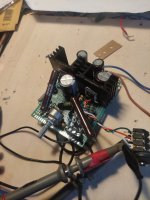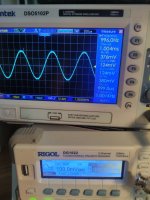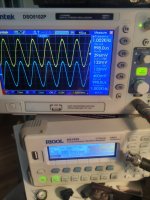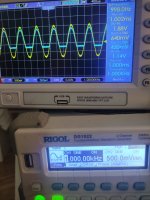Sennheisers are nice polite, easy to drive, good for long term listening, goodytwoshoes.I have HD595 in the cupboard and I think they are essentially the same as your 580s, just a cream colour and I also find that they roll-off at the high end, maybe our ears are rolling off. I am 70 in the shade.
For more accurate sound i preffer planars, for faster more dynamic sound.
Mr_zener, at about 1980 when working as design engineer at Hewlett Packard I had the opportunity to develop the linear amplifier found in the HP3354 function generator, which has a frequency range of DC to 50MHz. Later years I adapted this little amp to drive headphones, it is fairly complex for its time and distortion is non existent for its day, using HP propriety transistors is obviously ludicrous but I managed to replace them with readily available ones which may deteriorate performance a little. The problem that I had when listening to it, it is totally characterless regardless of its "purity" and not much fun to listen to for extended periods. If you feel like playing around with it, try and mess with its character, I am happy to post it.
Adason, planars are a bit above my pension grade, in fact I have never had the opportunity to hear any of those. I acquired my 600s when I was still an employed citizen.
I will be running it at 12V, using 43 and 20 ohm:Powered by 24VDC, using well regulated variable supply +/_12 VDC. It runs hot, but not too hot. May lower final power supply slightly.
Nice sound so far. No measurements done, may do quick distortion test later. Volume at 1/3 is terribly loud, yet still clean, so plenty of power with 220/100 ohm resistors already. It would be cooking at 43/20 ohms.
Q2 (TIP42C): 552mW
R5 (43 ohm): 364mW
R6 (20 ohm): 181mW
Managable I think. Cannot wait until I have all parts.
Yeah, sounds interesting! I like simple yet thinking outside the box type circuits, instead of the LTP > VAS > EF type. Works really well but personally found it boring and less rewarding than trying to be original, but so much has already been done already.Mr_zener, at about 1980 when working as design engineer at Hewlett Packard I had the opportunity to develop the linear amplifier found in the HP3354 function generator, which has a frequency range of DC to 50MHz. Later years I adapted this little amp to drive headphones, it is fairly complex for its time and distortion is non existent for its day, using HP propriety transistors is obviously ludicrous but I managed to replace them with readily available ones which may deteriorate performance a little. The problem that I had when listening to it, it is totally characterless regardless of its "purity" and not much fun to listen to for extended periods. If you feel like playing around with it, try and mess with its character, I am happy to post it.
I do keep few small boards taken out of pro digital tape players (tascam dats?), standalone board for built in headphone amp. Do not remember the opamp number, but very low distortion. Terrible sound. The worst solid state sound you can imagine. I built one board into box with its own power supply, just to taste this awful sound when i need the reference.Mr_zener, at about 1980 when working as design engineer at Hewlett Packard I had the opportunity to develop the linear amplifier found in the HP3354 function generator, which has a frequency range of DC to 50MHz. Later years I adapted this little amp to drive headphones, it is fairly complex for its time and distortion is non existent for its day, using HP propriety transistors is obviously ludicrous but I managed to replace them with readily available ones which may deteriorate performance a little. The problem that I had when listening to it, it is totally characterless regardless of its "purity" and not much fun to listen to for extended periods. If you feel like playing around with it, try and mess with its character, I am happy to post it.
On other hand i have three musical fidelity tube amps with 100 times more distortion which sound way better.
Why are people obsessed with distortion? I got chastised by bimo and mark tilerson so many times, that they both claimed independently that i am 'putting shades on mona lisa'.
Since it also occurs when unplugging, this will be DC leakage through the capacitor. This seems unavoidable unless the circuit is changed to make it DC coupled with low offset.... remains charged! is being charged as soon as power is on. I meant at same potential sorry for my technical inability. In fact the output will be at ground potential because the resistor will keep it there after the cap is charged up.
The only question is if 10k is enough, or 1k or lower will do. Up to the user to find out. Guess it depends whether 12VDC or 24VDC is used and 12ohm or 300ohm cans are used.
Yeah, just do a simple test, I have a feeling as long as the value isn't ridiculously high then it will remain basically 0. Also don't underestimate heat of the resistor.
The HD 560 will burn out at 1.2 watt of power. Adason, simply add a pot and tune it until the problem does not irritate you. Measure the resistance and replace with a fixed resistor.
Actually, i remember a web page, taken down later, which used grado headphone drivers as speakers in line array. Plenty of them, from floor to ceiling.
Guy claimed it was perfect...go figure.
Sometimes when i measured headphone amps (not this case) i used voltage values that would burn holes in my ear drums, but i did not wear the headphones for the test. Just to see the clipping behaviour. Headphones were so loud like little pc speakers. Yet no harm done. I do not do that anymore. Do not care about the limits, just normal listening conditions.
Few miliwatts is plenty.
Guy claimed it was perfect...go figure.
Sometimes when i measured headphone amps (not this case) i used voltage values that would burn holes in my ear drums, but i did not wear the headphones for the test. Just to see the clipping behaviour. Headphones were so loud like little pc speakers. Yet no harm done. I do not do that anymore. Do not care about the limits, just normal listening conditions.
Few miliwatts is plenty.
+1Do not care about the limits, just normal listening conditions.
Few miliwatts is plenty.
People with dBx meters instead of oscilloscopes make it so much more difficult for themselves, I think. The linear scale on a scope is so convenient in that it really only shows 20dB or so of transient peaks to start with. And the display is fast. So I'm able to resist dire warnings to add another 20dB (voltage x10!!) of headroom on top of the voltage range that I already think I need.
Better late than never. Here is my link for my 'Silkwave 1' headphone amplifier.
I think it's rather simple and interesting. What do you think?
I think it's rather simple and interesting. What do you think?
So Friends, finally had the time to rig that thing. Have you seen an ugliest protoboard?
However... This amplifier doesn't amplify. For the output, I used 82ohm and 220ohm, what I had in my stash.
The two pictures show measurement at full volume with resistive loads, 16ohm the first, 56ohm the second.
There is barely an amplification.
Voltages seems right though.
Need other output R values?
Edit:
I had current limiter on, yet it didn't get better: last pic shows output R of 16(clipping) and 56ohm, with input V of 0.5Vrms, how can be clean output V of only 0.64Vrms?
Re-edit, using a crap 24V/1A switching transformer... Need more juice...
However... This amplifier doesn't amplify. For the output, I used 82ohm and 220ohm, what I had in my stash.
The two pictures show measurement at full volume with resistive loads, 16ohm the first, 56ohm the second.
There is barely an amplification.
Voltages seems right though.
Need other output R values?
Edit:
I had current limiter on, yet it didn't get better: last pic shows output R of 16(clipping) and 56ohm, with input V of 0.5Vrms, how can be clean output V of only 0.64Vrms?
Re-edit, using a crap 24V/1A switching transformer... Need more juice...
Attachments
Last edited:
- Home
- Amplifiers
- Headphone Systems
- DIY Class A Headphone Amp suggestion



